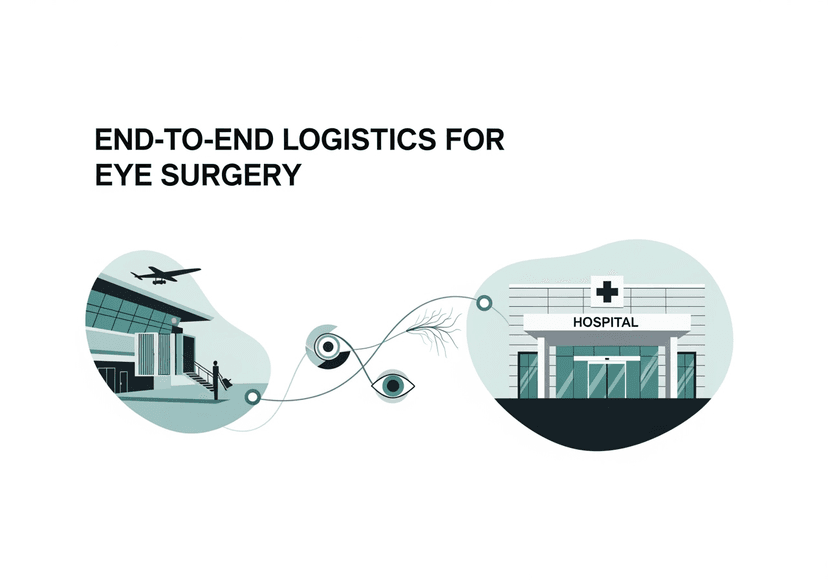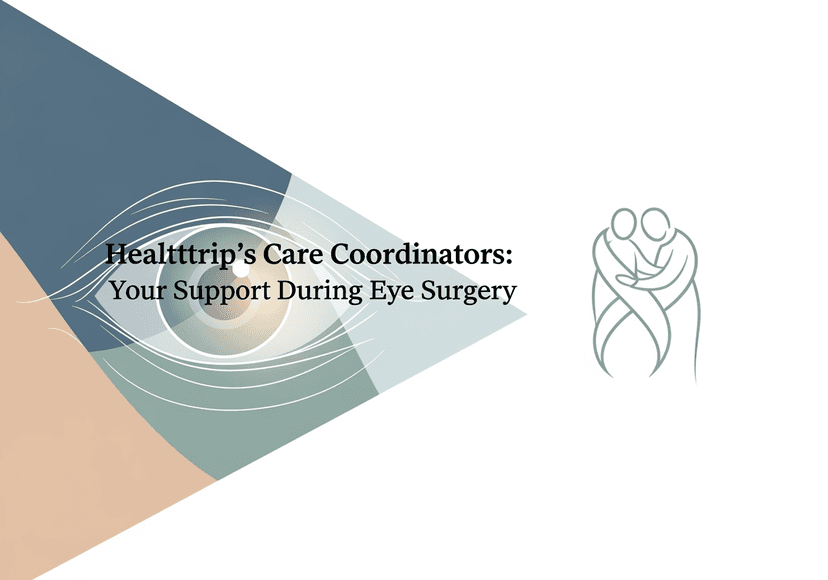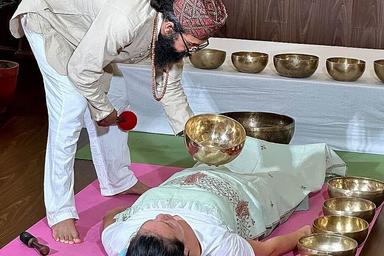
Cornea Transplants: Restoring Sight and Quality of Life
26 Sep, 2023
 Healthtrip Team
Healthtrip TeamWhat is a Cornea Transplant?
You might be wondering, what exactly is a cornea transplant? Well, it's a medical procedure where the damaged or diseased cornea of the eye is replaced with a healthy cornea from a donor. The cornea is the clear, transparent outer layer of the eye, and when it becomes damaged due to injury, disease, or other factors, it can seriously affect a person's vision. That's where a cornea transplant comes into play – it's a way to restore vision and improve the quality of life for those in need.
Now, why is a cornea transplant so important? Let me tell you, your cornea plays a vital role in your vision. It's like the window to your eye, allowing light to enter and focusing it on the retina at the back of your eye. When the cornea is damaged or cloudy, it's like trying to look through a foggy windshield – not very pleasant, right?
Most popular procedures in India
Cornea transplants are crucial because they can restore clear vision to people who have lost it due to various conditions such as corneal infections, injuries, or diseases like keratoconus. Imagine not being able to see the faces of your loved ones or enjoy the beauty of the world around you – that's the reality for many people with corneal issues. Cornea transplants give them a second chance at experiencing the world in all its glory. It's a gift of sight, and it can truly transform lives.
Understanding the Cornea
A. Anatomy of the Cornea
Now, let's delve a bit deeper into the cornea itself. It's not just a clear layer; it's a complex structure! The cornea consists of multiple layers, and it's transparent because it's made up of specialized cells that are neatly arranged. These layers work together to maintain the cornea's clarity and shape.
Wellness Treatments
Give yourself the time to relax
Lowest Prices Guaranteed!

Lowest Prices Guaranteed!
B. Function of the Cornea
The cornea has a pretty important job – it's like the eye's first line of defense and the main focusing element. You see, it's responsible for bending and focusing light as it enters the eye, which is the initial step in the process of seeing. Without a healthy and clear cornea, light can't be properly focused onto the retina, resulting in blurry or distorted vision.
So, in a nutshell, the cornea is like the eye's clear, protective shield, and it plays a key role in our ability to see the world around us. When it's damaged or not functioning correctly, it can severely impact our vision and overall quality of life. That's why cornea transplants are so important – they give people the chance to see clearly once again and appreciate the beauty of the world.
Symptoms indicating the need for a cornea transplant
- Blurred Vision: Gradual or sudden loss of clarity in vision, making objects appear fuzzy or out of focus.
- Eye Pain and Discomfort: Persistent eye pain, irritation, or a foreign body sensation that doesn't resolve with usual treatments.
- Sensitivity to Light (Photophobia): Increased sensitivity to light, causing discomfort or pain when exposed to bright light sources.
- Cloudy or Hazy Cornea: The cornea becomes cloudy or hazy, impairing vision and making the eye appear opaque.
- Vision Distortion: Distorted vision, where straight lines may appear wavy or objects may seem misshapen or distorted.
These symptoms can indicate various corneal conditions or diseases that may require a cornea transplant to restore vision and alleviate discomfort. It's important to consult with an ophthalmologist for a proper evaluation if you experience any of these symptoms.
Why Cornea Transplant is Done
A. Corneal Diseases and Conditions :Cornea transplants are performed for several reasons. One common reason is corneal diseases and conditions like keratoconus or Fuchs' dystrophy, which can cause corneal damage and impair ision.
B. Corneal Injury or Trauma: Accidents can lead to corneal injuries, causing pain and vision problems. Cornea transplants become necessary when trauma damages the cornea.
C. Corneal Scarring: Infections or injuries can leave scars on the cornea, blocking light and causing vision issues. A cornea transplant replaces the scarred cornea with a healthy one.
D. Previous Failed Cornea Surgery: Failed cornea surgery may require a second chance to improve vision and quality of life through a cornea transplant.
E. Improving Vision and Quality of Life : Ultimately, cornea transplants aim to enhance vision and overall quality of life, enabling individuals to see the world clearly.
Types of Cornea Transplants
1. Full Thickness Cornea Transplant (Penetrating Keratoplasty): This procedure involves replacing the entire damaged cornea with a healthy donor cornea.
2. Partial Thickness Cornea Transplant (DALK and DSEK): Partial-thickness transplants like DALK and DSEK replace specific corneal layers, offering targeted repairs.
3. Artificial Cornea Implants (Keratoprosthesis): For cases where traditional transplants aren't suitable, artificial cornea implants, known as Keratoprosthesis, provide high-tech alternatives to natural corneas.
Benefits of Cornea Transplant
Now, let's talk on to the benefits of a cornea transplant.
- Restored Vision: Clear and functional eyesight is regained.
- Relief from Pain and Discomfort: Alleviation of eye pain and discomfort.
- Improved Quality of Life: Enhanced ability to participate in daily activities and enjoy life.
Ultimately, a cornea transplant aims to enhance the recipient's quality of life. Being able to see clearly and comfortably participate in daily activities can have a profound positive impact on one's life.
So, when properly prepared and matched with a suitable donor, cornea transplants offer the promise of improved vision, reduced discomfort, and an overall better quality of life.
Preparation for Cornea Transplant
1. Before a cornea transplant, a thorough medical evaluation is essential. Doctors assess the patient's overall health and eye condition to determine if they are a suitable candidate for the procedure.
2. Finding a compatible donor cornea is crucial. Medical professionals carefully match the donor tissue to the recipient to minimize the risk of rejection.
3. Patients should have a clear understanding of the cornea transplant procedure. This includes discussing the surgical process, recovery expectations, and potential risks with their healthcare team.
4. Informed consent is a critical step in the preparation process. Patients are provided with detailed information about the surgery and its potential outcomes, allowing them to make an informed decision to proceed.
5. Patients may need to make temporary lifestyle adjustments before the surgery, such as discontinuing certain medications or avoiding contact lenses to ensure a successful transplant.
The Cornea Transplant Procedure
A. Pre-Operative
- Anesthesia: The patient receives local or general anesthesia to ensure a pain-free procedure and prevent any movement during surgery.
- Marking the Cornea: The surgeon marks the cornea to guide precise placement of the donor cornea during the transplant.
B. Intra-Operative
- Donor Cornea Preparation: The donor cornea, carefully matched to the recipient, is meticulously prepared, often by trimming and shaping it to fit the recipient's eye.
- Cornea Transplant Surgery: The damaged or diseased cornea is removed, and the prepared donor cornea is securely stitched or glued into place using highly specialized techniques.
C. Post-Operative
- Sutures or Glue: Depending on the surgical method and the surgeon's preference, sutures or medical adhesive may be used to close the incision. Sutures are typically removed in a later follow-up appointment.
- Eye Patching: The patient's eye may be patched or shielded to protect it from potential damage and to aid in the healing process.
This sequence of pre-operative, intra-operative, and post-operative steps is carefully executed to ensure a successful cornea transplant procedure.
Diet and Nutrition Pre-Transplant
A. Maintaining a Balanced Diet
- Ensuring a diet rich in vitamins and minerals, especially vitamin C and vitamin A.
- Consuming antioxidants from fruits and vegetables to support eye health.
- Adequate protein intake for tissue repair.
B. Staying Hydrated
- Drinking plenty of water to maintain overall health and eye hydration.
- Reducing caffeine and alcohol intake, which can contribute to dehydration.
Road to Recovery and Aftercare
A. Medications and Eye Drops
- Strictly following the prescribed medication regimen to prevent infection and rejection.
- Administering prescribed eye drops as directed by the ophthalmologist.
B. Follow-Up Appointments
- Attending regular follow-up appointments with the ophthalmologist for monitoring and adjustments.
- Reporting any unusual symptoms or changes in vision promptly.
C. Protecting the Eye
- Avoiding activities that could harm the eye, including contact sports.
- Wearing eye protection when necessary, such as during physical activities or in dusty environments.
D. Gradual Resumption of Activities
- Gradually returning to normal activities as advised by the healthcare team.
- Avoiding strenuous activities until cleared by the ophthalmologist.
Risks and Complications
- Infection:
- Risk of bacterial, viral, or fungal infections at the transplant site.
- Graft Rejection:
- The recipient's immune system may identify the transplanted cornea as foreign and attempt to reject it.
- Elevated Intraocular Pressure (IOP):
- Increased pressure inside the eye (glaucoma) can occur due to surgery or steroid medications.
- Astigmatism:
- Irregular shape of the transplanted cornea may result in astigmatism, leading to distorted vision.
- Glaucoma:
- Build-up of fluid in the eye can damage the optic nerve, potentially leading to vision loss.
- Corneal Edema:
- Swelling of the cornea due to fluid accumulation can cause blurred vision and discomfort.
- Sutures Complications:
- Problems with the stitches, such as loosening or irritation, can occur.
- Delayed Healing:
- The cornea may take longer to heal than expected, delaying visual recovery.
- Secondary Cataract Formation:
- Development of a cloudiness in the lens of the eye (cataract) may require additional surgery.
- Persistent Redness and Irritation:
- The eye may remain red and irritated for an extended period.
It's important to note that while these risks and complications exist, many patients have successful cornea transplants with minimal issues. Close monitoring and adherence to post-operative care are crucial for minimizing these risks.
Special Tips for Successful Cornea Transplant
- Strict Medication Adherence:
- Take prescribed eye drops and medications as directed by your doctor to prevent graft rejection and infection.
- Avoiding Eye Rubbing:
- Refrain from rubbing or touching your eyes to reduce the risk of damaging the transplant or introducing infections.
- Sunglasses and Eye Protection:
- Wear sunglasses with UV protection and eye protection when engaging in activities that could expose your eyes to injury or irritation.
- Regular Follow-Up with the Ophthalmologist:
- Attend all follow-up appointments with your eye doctor to monitor the progress of your transplant and address any issues promptly.
- Healthy Lifestyle Choices:
- Maintain a healthy diet, exercise regularly, and avoid smoking to support overall eye health.
- Protect Your Eyes from Irritants:
- Shield your eyes from dust, wind, and other environmental irritants, especially during the early stages of recovery.
How can we help with the treatment?
If you're on the lookout for cornea transplants in India, let Healthtrip be your compass. We will serve as your guide throughout your medical treatment. We'll be by your side, in person, even before your medical journey commences. The following will be provided to you:- Connect with renowned doctors from a network spanning 35+ countries and access the world's largest health travel platform.
- Collaboration with 335+ top hospitals , including Fortis and Medanta.
- Comprehensive treatments from Neuro to Cardiac to Transplants, Aesthetics, and Wellness.
- Post-treatment care and assistance.
- Teleconsultations at $1/minute with leading surgeons.
- Trusted by 44,000+ patients for appointments, travel, visa, and forex assistance.
- Access top treatments and packages, such as Angiograms and many more.
- Gain insights from genuine patient experiences and testimonials.
- Stay updated with our medical blog.
- 24/7 unwavering support, from hospital formalities to travel arrangements or emergencies.
- Pre-scheduled specialist appointments.
- Prompt emergency assistance, ensuring safety.
In conclusion, cornea transplants have the power to transform lives by restoring vision and improving overall quality of life. By understanding the importance of eye health and promoting cornea donation, we can ensure that more individuals can experience the life-changing benefits of clear vision, highlighting the crucial role of cornea transplants in our communities.
Related Blogs

How Healthtrip Ensures Quality & Safety in Eye Surgery Procedures
Detailed guide on eye surgery, featuring doctors, hospitals, risks, recovery,

End-to-End Logistics for Eye Surgery with Healthtrip's Support
Detailed guide on eye surgery, featuring doctors, hospitals, risks, recovery,

Healthtrip's Care Coordinators: Your Support During Eye Surgery
Detailed guide on eye surgery, featuring doctors, hospitals, risks, recovery,

Top 5 Indian Hospitals for Eye Surgery
Detailed guide on eye surgery, featuring doctors, hospitals, risks, recovery,

Post-Eye Surgery Diet and Lifestyle Tips
Detailed guide on eye surgery, featuring doctors, hospitals, risks, recovery,

Common Risks in Eye Surgery and How Healthtrip Manages Them
Detailed guide on eye surgery, featuring doctors, hospitals, risks, recovery,










